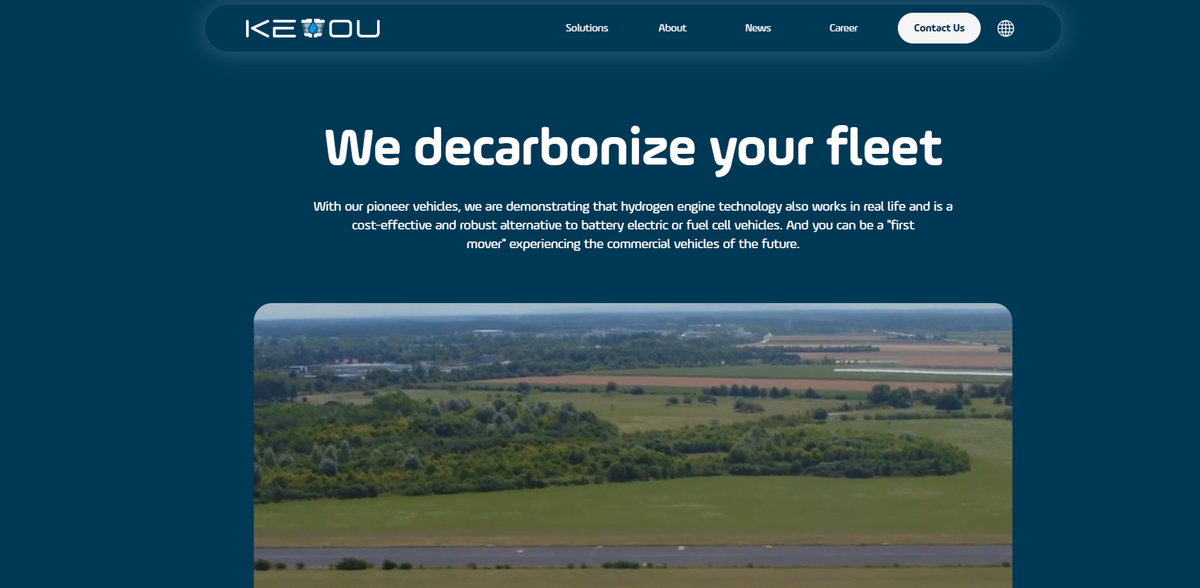Project Overview: Emission-Free Hydrogen Mobility Transformation
The project transforms conventional diesel engines into emission-free hydrogen engines by converting existing vehicles without compromising performance, capacity, or range. KEYOU, a pioneer in clean mobility based in Munich since 2015, demonstrates how hydrogen engine technology can work in real life. Drawing from a rich background in hydrogen innovation, this initiative shows that converting engines into clean, robust systems is not only cost-effective but also a viable alternative to battery electric or fuel cell vehicles. The approach brings new life to existing fleets, ensuring a smooth transition to zero-emission mobility while preserving the original business model. In short… it is a paradigm shift for the transportation sector.
Main Benefits: Efficiency, Cost-effectiveness, and Simplicity
Unparalleled advantages emerge from this hydrogen conversion technology:
- From €0.58 per kilometer – including an all-round service, maintenance package, and full insurance coverage.
- The innovative KEYOU 40-ton truck and 18-ton models, designed to meet long-distance operational needs.
- Engine power of 210 kW and a maximum torque of 1,000 Nm, ensuring performance similar to conventional diesel engines.
- A storage system with a capacity of 27 kg of hydrogen allowing ranges from approximately 350 km to even 600 km.
- A comprehensive pay-per-use package that includes vehicle rental, servicing, maintenance, and hydrogen fuel supply.
Innovative Engine Conversion
At the heart of the project lies the KEYOU-inside hydrogen engine, a smartly upgraded diesel engine that transitions from polluting fuels to clean hydrogen combustion. The conversion process involves just the necessary core sub-system enhancements to enable optimal hydrogen operation, resulting in a robust engine that meets strict EU emission standards (less than 1 g CO2/kWh). The method offers new opportunities for fleet operators who wish to maintain their current operational methods while stepping into future-forward zero-emission mobility. It is a brilliant example of combining the old with the new, using existing engine platforms to achieve a cleaner tomorrow.
Comprehensive Mobility as a Service
Beyond engine conversion, the initiative stands out by offering a complete hydrogen mobility solution. This all-inclusive package covers every aspect of transitioning to hydrogen equilibrium – from vehicle conversion and fuel supply to full insurance coverage and professional service and maintenance. By utilizing a pay-per-use model, operators avoid hefty upfront investments and the associated risks. Instead, they benefit from a fixed monthly flat rate per kilometer, which streamlines budgeting and ensures a smooth, predictable migration to hydrogen-based transport. The service ensures that vehicles are not only transformed but that their ongoing operation is managed professionally through a well-established partner network.
Passing the Test in Real Environments
Demonstrations under real-life conditions reveal that the converted vehicles deliver both performance and reliability. The introduction of eight converted 18-ton trucks, slated for delivery to pioneer customers by the end of 2024, highlights the readiness for market adoption. Field tests indicate that the hydrogen-engine vehicles offer consistent performance even on long-distance routes where efficiency is paramount. With familiar driving dynamics and operational safety intact, these vehicles allow fleet operators to embrace innovation without disrupting established routines. Engineered to perform where and when it matters, the system redefines conventional expectations of heavy-duty commercial transport.
A New Era of Clean Technological Integration
This revolutionary approach builds on decades of engineering expertise. The backbone of the project is an unyielding commitment to practical, effective hydrogen mobility. Inspired by a humble beginning in a Porto basement, the founders—each with over 20 years of experience in alternative drive technologies—sought to shape the future of sustainable transport. Today, their vision stands as a testament to converting traditional engines into zero-emission workhorses that still pack a punch. The technology, refined over years of research and real-world application, brings together innovation, efficiency, and environmental responsibility in a single, game-changing package.
Project Impact: Advancing Sustainable Development Goals
- SDG 7: Affordable and Clean Energy – by providing a cost-efficient and renewable transport solution.
- SDG 9: Industry, Innovation, and Infrastructure – through groundbreaking engine conversion technology and the establishment of robust service networks.
- SDG 11: Sustainable Cities and Communities – via the promotion of greener urban transport systems.
- SDG 13: Climate Action – by substantially reducing CO2 emissions and supporting global efforts to combat climate change.
Future Prospects and Vision in Hydrogen Technology
Looking ahead, the momentum generated by this project is poised to influence the entire commercial vehicle sector. With its proven capability of transforming existing vehicles into hydrogen-powered machines, the approach offers a second life to conventional trucks while pushing the boundaries of sustainable technology. As more fleet operators witness the advantages of the pay-per-use model and the ease of integration into existing operations, market adoption is expected to accelerate. The project’s dynamic, conversational nature—marked by an emphasis on reliability, affordability, and ease of transition—sets the stage for a greener and more sustainable future in commercial logistics. Future prospects include extended product lines, new service partnerships, and continued innovation aimed at keeping vehicles on the road longer, cleaner, and more efficient. The evolution of hydrogen technology continues, reinforcing the belief that clean mobility need not compromise performance, ultimately paving the way for a revolution in how transport systems work globally.


















